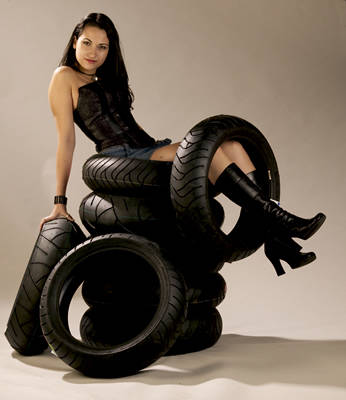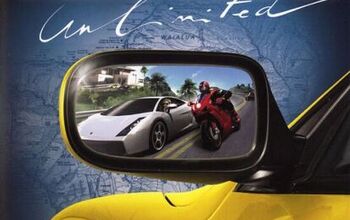The Epistemology of Buying Tires
I studied epistemology in a college religion class. Epistemology is a fifty cent word for the branch of philosophy that explores the way in which man learns truth. What leads a person to the certain conclusion that God exists? Is it the conclusion of a logical process? Or personal spiritual experience? Maybe it’s embracing family tradition? At the risk of offending deity and condemning my soul to an eternity burning amid fire and Bridgestone, I liken the process of buying new tires to the quest for faith.
When we buy a car, we are able to visit local dealerships to test drive the vehicles under consideration. We can see, hear, feel, smell and [theoretically] taste a car before we buy it. Of course there are variables that are unknowable after 20-minutes at the helm and an hour putzing around the sales floor. But our personal sensory experience generally provides enough data to conclude whether a candidate car meets our needs, desires, and budget.
It’s not the same with tires. Ideally buyers could mount various tires to their car and perform comparative test drives back-to-back before deciding on what rubber they want to invest in.
The closest experience I’ve had to this occurred last year when Cooper Tires invited me (along with a dozen other auto journalists) to their test track near Pearsall, Texas. They prepared a number of head-to-head comparisons between their new CS4 tire and selected competitors.
Scribes were allowed to race a Mustang fitted with CS4s through a wetted rally track back-to-back with a second Mustang fitted with Bridgestones. Next we drove two identical Cadillac DTS’ shoed with Coopers and Continentals through an emergency stop trap. In each instance, the CS4 performed favorably.
I don’t think the Cooper folks did anything underhanded, but like a vacuum cleaner salesman who demonstrates his product sucking-up nuts and bolts, the tests were clearly designed to show their product in the most favorable light.
So we’re still relegated to grasping for truth through a fog-filled maze of mirrors. The manufactures (i.e. father of lies) and their self-serving marketing claims simply can’t be trusted. Most tire dealers (i.e. devil’s spawn) are equally untrustworthy; they will spin you toward the tire that makes them the most money. Car buff book, consumer guides and tire rag evaluations (i.e. sacred writ) are compromised by the same temptations that afflict their car reviews: pressure from big advertisers and addiction to the press junket gravy train.
That narrows reconnaissance options to word-of-mouth and Internet reviews (i.e. testimonials), both of which are also fraught with risk. When your neighbor (i.e. the zealot) tells you about his favorite tire, you have to wonder, “What the Hell does HE know about it?” Has he compared his favorite doughnut to each competitor so he can draw comparisons? More importantly, his automobile and driving style are unlikely to match your own.
Internet user reviews might be the most suspect of all. You can never fully know the background and biases of the reviewers. A bitter critic stung by bad service or stuck with a lemon could be on an e-jihad to ensure that the world hears of his pain. Furthermore, I find that familiarity breeds contempt among the most popular models. Somehow human nature makes us want to despise the successful and root for underdogs.
On the other hand, the review you are reading might be the handiwork of a marketing firm looking to stack the net with glowing reviews of their client’s product. Shopcartusa.com (i.e. Beelzebub) is an obvious example of this nefarious practice.
[Last year, as I searched for the best deal on a new camera body I stumbled across their site. Their “customers” unwaveringly gave thousands of five-star ratings and rave reviews of known suspect merchants, some of whom fell under indictment by the New Jersey State Attorney General.]
If you manufactured tires, wouldn’t you make sure that there were as many positive reviews about your product posted on TireRack.com as possible? If an electronic warrior is smarter than the guys at Shopcartusa.com, they can make favorable reviews look quite natural and convincing.
Most tire buyers become so confused by the chorus (i.e. legion) of unreliable messages that they immerse themselves in the only thing they know for sure– their own experience (i.e. tradition). But this fear of getting something bad blinds us from discovering anything better.
In my most recent tire search, my cynical self (i.e. the tire agnostic) was left to sort through the mass of information, sniffing each data and casting aside anything smelling of spin, reeking of bile or spritzed with eau de incompétence. I looked for threads of consensus from the many differing sources that remain. Balancing these conclusions against my needs and budget led me to my final selection. And then I prayed that I’d made the best choice.
[Cooper tires provided Mr. Montgomery with lunch, track time and insurance.]
More by William C Montgomery
Latest Car Reviews
Read moreLatest Product Reviews
Read moreRecent Comments
- V8fairy Not scared, but I would be reluctant to put my trust in it. The technology is just not quite there yet
- V8fairy Headlights that switch on/off with the ignition - similar to the requirement that Sweden has- lights must run any time the car is on.Definitely knobs and buttons, touchscreens should only be for navigation and phone mirroring and configuration of non essential items like stereo balance/ fade etc>Bagpipes for following too close.A following distance warning system - I'd be happy to see made mandatory. And bagpipes would be a good choice for this, so hard to put up with!ABS probably should be a mandatory requirementI personally would like to have blind spot monitoring, although should absolutely NOT be mandatory. Is there a blind spot monitoring kit that could be rerofitted to a 1980 Cadillac?
- IBx1 A manual transmission
- Bd2 All these inane posts (often referencing Hyundai, Kia) the past week are by "Anal" who has been using my handle, so just ignore them...
- 3-On-The-Tree I was disappointed that when I bought my 2002 Suzuki GSX1300R that the Europeans put a mandatory speed limiter on it from 197mph down to 186mph for the 2002 year U.S models.

































Comments
Join the conversation
Kevin, Bear in your mind that your small review has no bearing on what the tire is ACTUALLY like without a description of the car they are mounted on (is it 2000 pounds, 3000, 4000 pounds....are they mounted on 15x6 wheels in a 195/70/15 size?), your driving habits, the tire pressure you keep them inflated at, etc. Otherwise "they are the best tires ever and have lasted for XXXXX miles" means nothing. If you only buy tires once every 5-6 years, then yes, I would expect a brand new tire to be better than any other before it. That's progress. 15 year old tires SHOULD NOT be as good as tires produced now. Joe
I rarely get involved with commenting on sites like this, But, I bought nexen 702's all round for the 2000 Buick LeSabre I drive. I live in central Ontario so we get some good snow and rain. While these tires are a bit louder that my old ones (continentals) these handle my aggressive driving quite well. Had a nerfelburger stop in front of me on Hwy11 in a downpour in the fall cause he saw a deer some 60 yards off in the bush and the new tires slowed me down and allowed me to get around this citiot so he could enjoy his Kodak moment. I was sold on them after that. They are, however quite a bit louder on concrete highways a la Pennsylvania. If you can live with that they will work well on your heavy car.